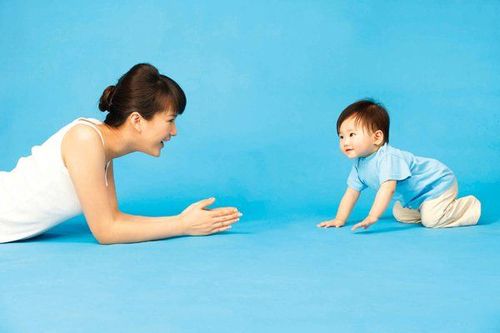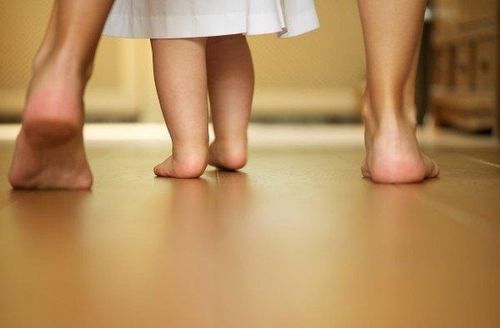This is an automatically translated article.
The article was professionally consulted with resident Doctor Duong Van Sy - Doctor of Pediatrics - Neonatology - Department of Pediatrics - Neonatology - Vinmec Hai Phong International General Hospital.1. Stages of infant development in the first year
1.1 Stage 1: infants 1 to 3 months of age During this first stage of development, an infant's body and brain are learning to get used to the outside world. From birth to three months, your baby can begin to:Within the first 3 months your baby will learn to smile and respond to your smile Your baby will try to raise his head and chest, this shows The child's skeletal and muscular systems have been enhanced to a new level. Attention follows interesting objects Hands to mouth Grasping objects Grasping or touching objects within sight, even though This is in an unreachable distance Parents can learn how to get to know your baby in the first week in the following article: The first week after birth: Getting to know your baby

Flip back and forth and crawl to where he wants to Make sounds like real language Laugh out loud Reaching out his hand and grabbing objects in his or her eye, yes can use their hands to control toys and other objects 1.3 Stage 3: 7 to 9 months old During the second half of an infant's first year, your baby will be more active and moving as it identifies To get to a certain position by crawling or crawling, it will take a baby several months to discover how to crawl forward or backward. Parents should take time to enjoy this time with their children.
Baby begins to crawl on hands and knees, including crawling, some babies will not crawl but transition from school to walking Child can sit without needing support Child can respond and react to familiar words, such as your baby's name by stopping and looking at you, some early talkers begin to babble simple words like ba, me... Children can clap their hands and enjoy playing games Playing games such as hide and seek, find objects Parents need to use methods to stimulate the child's brain development and pay special attention to protecting children's safety.

Begin to feed themselves with a spoon, master grasping skills, can hold objects with index finger and thumb Child can grasp when walking to explore the world around Children can say one or two simple words like mom and dad. On average, children will speak 3 words before their first birthday, but this depends on the development of each child's skills Pointing to objects that children want to attract parents' attention Children begin to learn follow your actions, such as pretending to answer the phone Perfecting children's skills with combinations of early education methods. At this stage, in addition to the child's efforts, parents also need to trust their instincts. If you really feel that something is wrong, you should consult your doctor because if there is a problem, early intervention is best and you are the one who knows your child best.
There is no such thing as an exact time period for children to practice their skills. If your baby has not yet achieved the skills according to the above stages, you should not be too worried because this is completely normal in infant development.

2. Some ways to help babies develop actively in the first year
Here are some things you should do as a parent to help your child develop actively during this time:You should take time to talk with your child. Children will feel safer when they hear your voice. Respond when your baby makes a sound by repeating the sound and adding words. This will help children learn to use language. Read to your baby: This will help your baby understand language and sounds. Sing to your baby and play with him: This will help your baby develop a love of music and will help his brain develop. It is necessary to actively praise and give lots of love and care to children. Spend as much time cuddling and holding your baby as you can. This will help the child feel cared for and safe. Baby's diet: The weight of babies at this stage is one of the biggest concerns of parents. However, you should not put too much importance on this issue, it is easy to put psychological pressure on yourself as well as with the children. Implement a reasonable diet for 1-year-old children to help them be healthier. Play with your baby: Watch your baby closely for signs of fatigue or fussiness to let them rest. Distract your child with toys and take him to a safe area when he starts moving and touching things he shouldn't be touching. Take care of yourself physically, mentally and emotionally. Parenting can be hard work, taking care of a newborn will be easier if parents always think in the most positive way and love themselves.

3. Some notes when taking care of babies in the first years
You need to make sure the environment around the child is safe. As a parent, it's your job to keep your child safe, both physically and emotionally. Here are some notes when taking care of a newborn in the first years:Do not shake the baby because at this time the baby's neck is still very weak. If you shake your baby, this can cause brain damage and even death. Make sure you keep an eye on your baby every time he sleeps because some babies can develop sudden infant death syndrome (SIDS). When in a car, it is necessary to put the baby in the back seat and have a separate seat for infants. Children's food needs to be cut into small pieces to avoid choking. In addition, children should not be allowed to play with small objects because they are easy to swallow. Protect children from secondhand smoke. Do not allow anyone to smoke in your home Do not let children play with anything that covers their faces Never leave hot food or hot water near children It is necessary to vaccinate children fully and at the right time to keep them safe. health protection. Babies in their first year may reach certain developmental milestones before certain times or may be slower. This is normal. However, this can also be a warning sign of a child's developmental delay. Therefore, you need to pay attention to observe and if there are any abnormal signs, take your baby to a medical facility to be checked. If there is a problem, early detection will help the treatment process achieve better results.
To help children develop comprehensively from the first years of life, parents should supplement their children with essential micro-minerals such as zinc, lysine, chromium, selenium, vitamin B1, ... to help fully meet their needs. nutrition in children. The addition of these essential vitamins also supports digestion, enhances nutrient absorption, improves anorexia, and helps children eat well. Parents can simultaneously apply dietary supplements and functional foods derived from nature for easy absorption. Please accompany your child in the development process and regularly visit the website vimec.com to update useful baby care information.
Please dial HOTLINE for more information or register for an appointment HERE. Download MyVinmec app to make appointments faster and to manage your bookings easily.
Reference source: mayoclinic.org; cdc.gov













